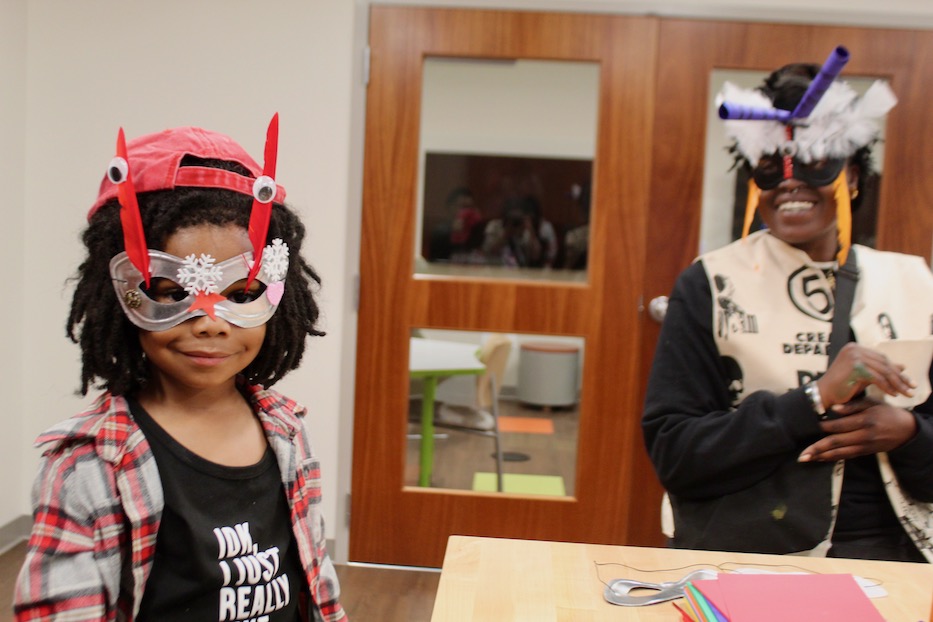
Books | Culture & Community | Dixwell | Arts & Culture | New Haven Free Public Library | Arts & Anti-racism | Elm City LIT Fest | BAMN Books | Dixwell Community Q House
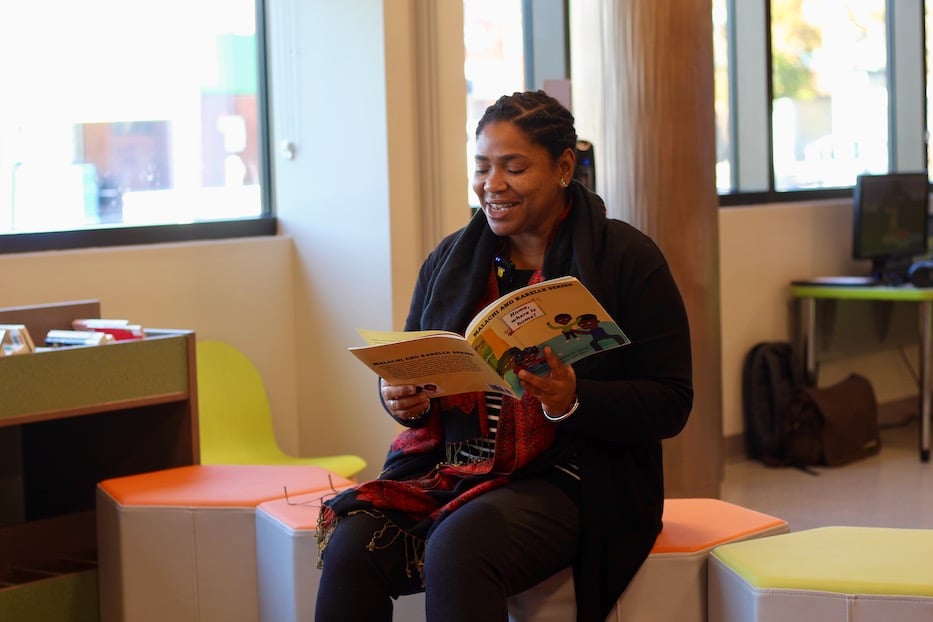
Author Rosamond White, reading from her book Home: Where Is Home? Lucy Gellman Photos.
On the first floor of Stetson Library, listeners were on a trip to the Caribbean, following the journey of storybook characters Malachi and Karelle. Perched on a soft, seafoam-green stool, author Rosamond White turned the page, and suddenly her protagonists were on an airplane, flying above the Atlantic Ocean. Beneath them, Guadeloupe’s island of Basse-Terre beckoned, covered in a canopy of green. She looked up.
“You see, you can have more than one home,” she said. “And sometimes, home is so much more than a building.”
That sense of adventure seized Stetson Library and the Dixwell Community Q House Saturday, as the third annual Elm City LIT Fest arrived with a celebration of Black books, poetry, music and food in New Haven. From Stetson to the Q House gymnasium to plazas on both sides of Dixwell Avenue, artists put their spin on “Black To The Future,” a central theme meant to lift up Afrofuturism in all its forms. Like last year’s festival, it has continued to grow, with a vendor fair, author panels, workshops, and live performances throughout the day.
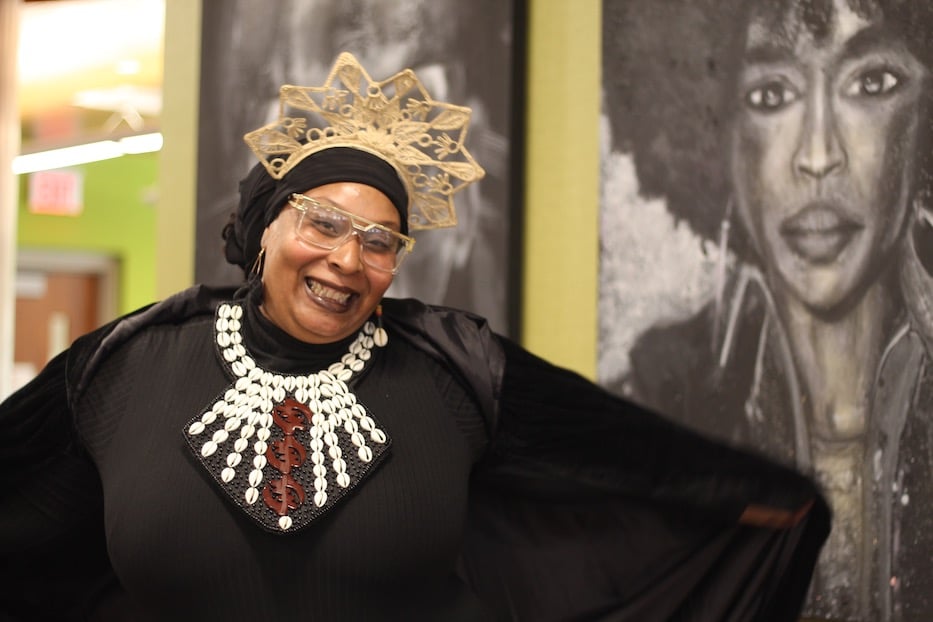
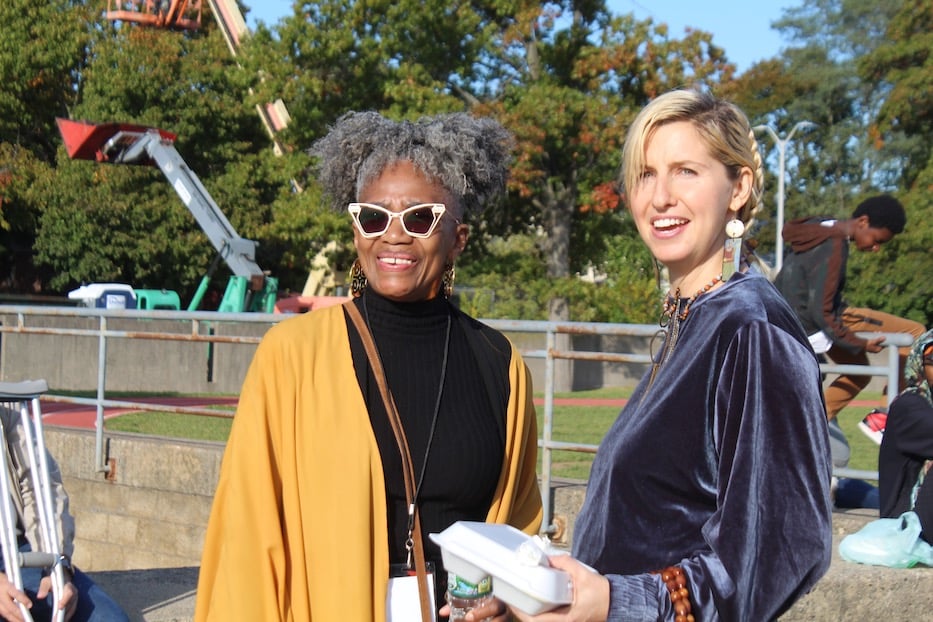
Top: The poet Sun Queen came prepared for Saturday's Afrofuturist theme. Bottom: LIT Fest Founder IfeMichelle Gardin (in orange) with New Havener Katie Jones.
“It means envisioning a future of our own,” said festival and Kulturally LIT Founder IfeMichelle Gardin, who has grown the festival from a community book club into a six-hour celebration of literature across the African diaspora. “Like, empowering people—that’s why we’re bringing LIT Fest into the fold. It’s bringing people awareness of their own culture, so they can empower themselves to move forward as their authentic selves, to save our community, and to build it.”
Across the library and the Q House, that empowerment took dozens of forms, from cosplay and children’s literature to composing. In a sun-soaked alcove on the first floor, half a dozen kids gathered around White, listening as her Antiguan lilt sailed softly through the space. As she read, 8-year-old Alec Gordon leaned in, his ears catching on a story that sounded familiar. He later told White and fellow listeners that his second home is his father’s home island of Jamaica.
For White, who lives in East Hartford, that kind of feedback is exactly why she wrote the book. Born in Antigua, she first came to the U.S. as a teenager, and spent her young adult years in Brooklyn. It meant that she grew up with a foot between worlds, she said—an experience shared by so many immigrants in and beyond Connecticut.
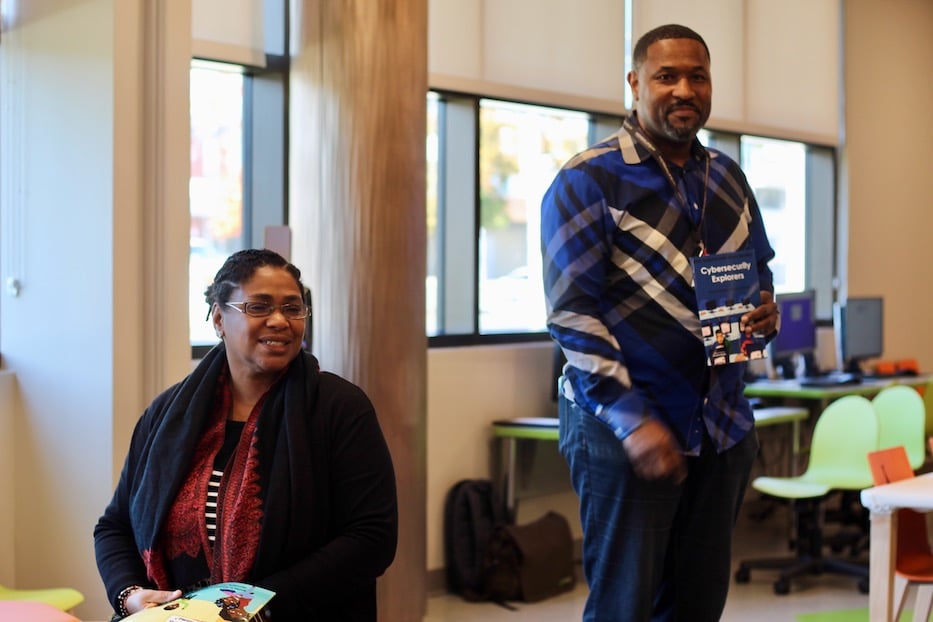
White and Fitzroy Gordon. Lucy Gellman Photos.
When she decided to write down her story, she connected with Lauren Simone Publishing House, a Black-owned, mother-daughter operation in East Hartford that specializes in children’s books with protagonists of color. Saturday, founders Melissa-Sue John and daughter, Olivia Lauren, listened as White and fellow Black authors ushered in the afternoon with their words.
By the time White had yielded the floor to Fitzroy Gordon, the author of Cybersecurity Explorers, at least a dozen attendees filled the space. Turning on a video accompaniment, Gordon pulled up the symbols for Discord, Roblox and Meta and asked attendees to identify them. As he spoke, a pint-sized superhero entered the room, making his way over to a table to listen. His cape trailed noiselessly behind him.
Just feet away from their readers, authors showed young readers how it was possible to travel across the country—and the world—without ever leaving the library. With her book Down South for the Summer, New Havener Patricia Bellamy-Mathis took listeners on a road trip to South Carolina, transporting them to a wide, grassy plot of land on which her grandparents had a thriving garden and house that was always full of laughter and conversation. She turned a page, the illustrations bright, and kept reading as her infant daughter Nova fell asleep in a fabric sling on her chest.
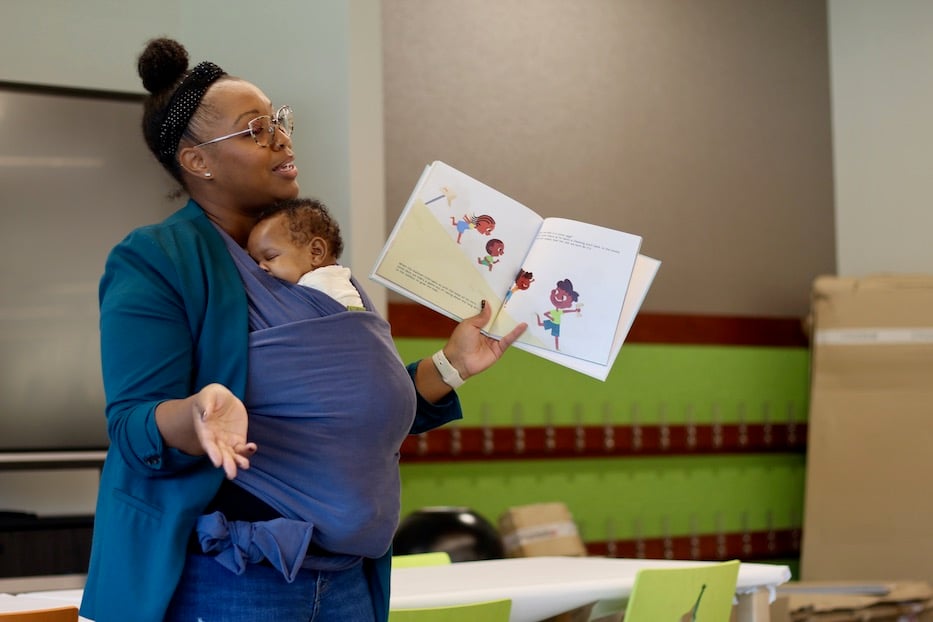
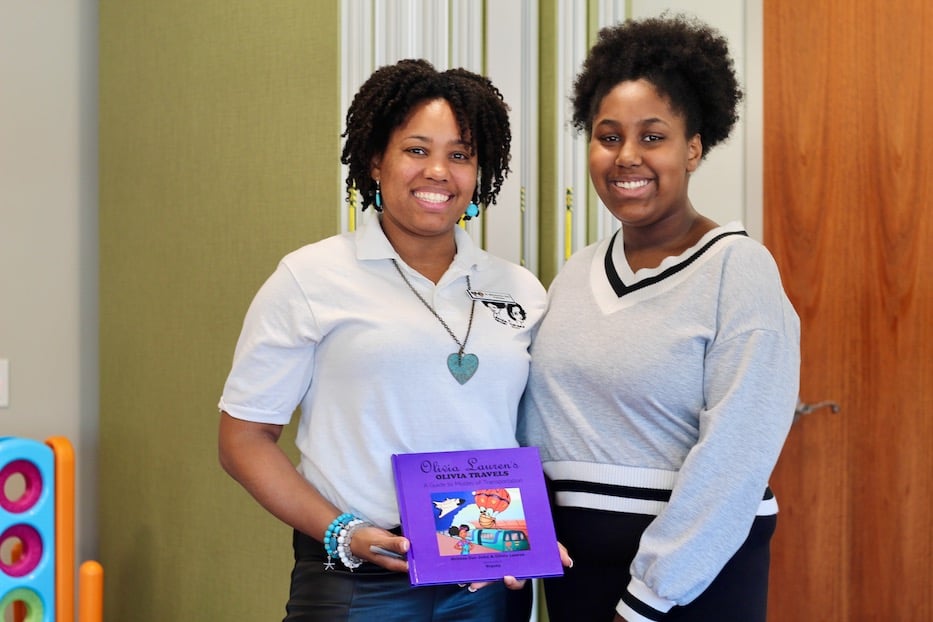
Top: Author Patricia Bellamy-Mathis and Nova. Bottom: Melissa-Sue John and Olivia Lauren. Together, they run Lauren Simone Publishing House. Lucy Gellman Photos.
Minutes later, Olivia Lauren cracked open her Guide To Modes of Transportation, and began to read. Alec and Antoine Gordon looked on, delighted as Olivia pointed to horse-drawn carriages, big transport vans, and rocket ships with bright plumes of smoke coming out of their engines. Antoine, who is in eighth grade, later said that events like LIT Fest help him feel inspired to write.
“I think it’s really cool,” Olivia later said of LIT Fest. “It’s been really nice to meet them [other authors] and have them share their experience and their stories.”
John applauded the festival’s focus on a multiplicity of Black voices, from children’s books on travel, migration and family to James Baldwin, science fiction, and poetry delivered in at least two languages before the end of the day.
“It’s just nice to get that representation, that visibility,” she said. “You see other voices doing the same work.”
Masked Magic & Magnificent Dreaming
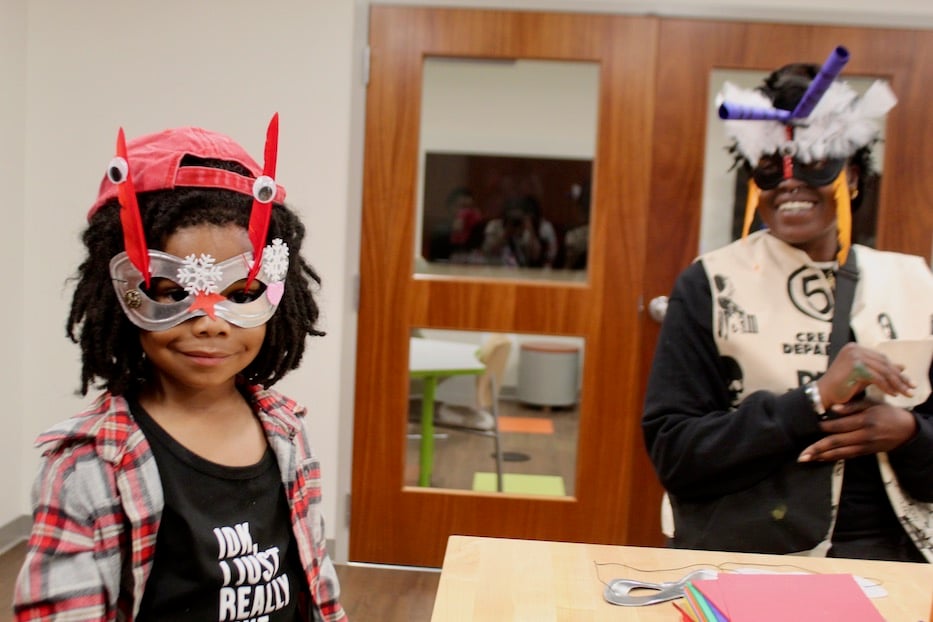
Z'mir and Marsh, who joked that she was an alien. Lucy Gellman Photos.
On the second floor, conversation rose in short, quiet bursts across a small makerspace as the artists Candyce “Marsh” John and Rita Charles helped attendees craft Afrofuturist masks with feathers, lace, ribbon, thick markers, and all manner of googly eyes.
At one side of the table, five-year-old Z’mir and his mom Zequanda Wright pored over a pad of yellow construction paper, plotting their next design. At the other, Stephanie Greenlea and six-year-old Zora worked on a rainbow-patterned mask.
Already, Z’mir rocked a silver-tinted mask, with two large snowflake shapes and red feathers that matched his backwards baseball cap. At the top of each feather, a single googly eye looked out into the space. Marsh studied the design, two blue construction paper antennae sticking out from her head as she came in close.
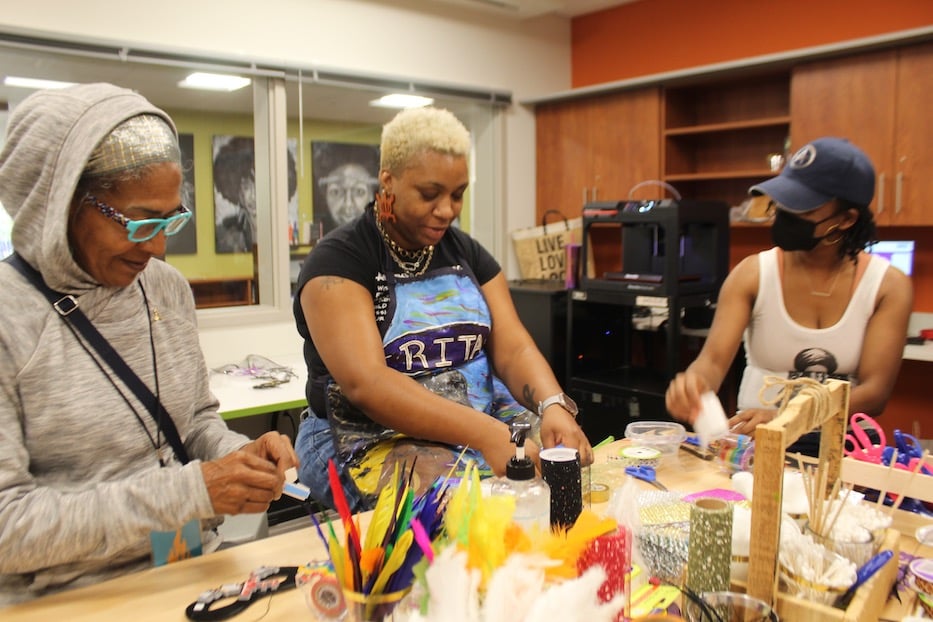
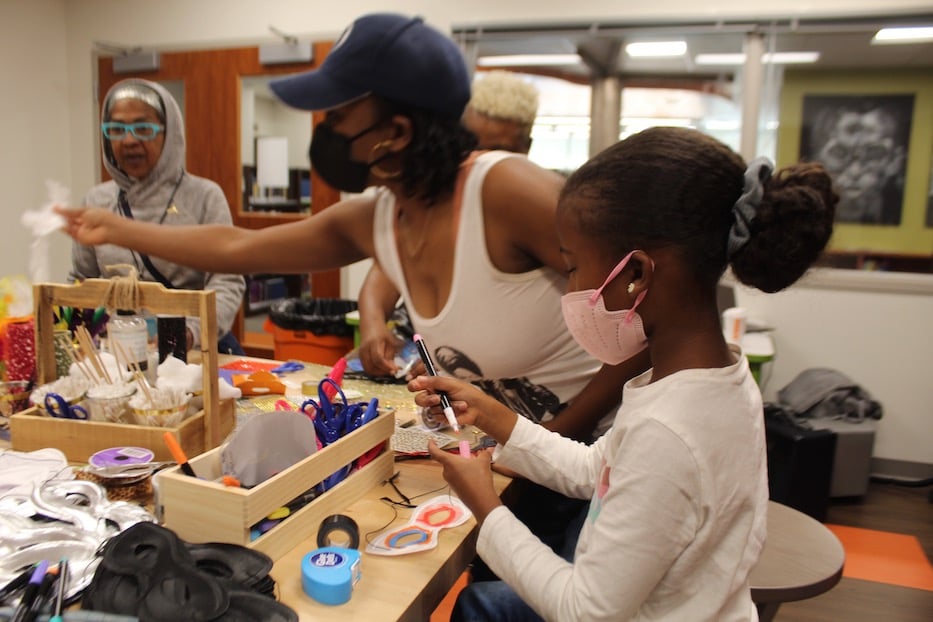
Top: Bianca Kay, Rita Charles, and Stephanie Greenlea. Bottom: Zora Greenlea works on a mask. Lucy Gellman Photos.
From across the room, she appeared part-human, part-bird, with white and orange plumage blooming from her eyes. Something Daedalean tugged at the corners of her mouth.
“I’m an alien,” she said. “I just got stuck here a long time ago.”
“The eyes are windows,” Z’mir answered, so quiet when he spoke that a listener had to lean in to hear. Marsh sat with the statement for a moment, as if someone had just told her that the universe was expanding for the first time. Then she snapped back to artmaking, writing out Z’mir’s name in black marker.
Z’mir giggled, and soon the laughter was contagious. Six-year-old Zora looked up from her mask to take in the creature who emerged before her. Beside her, her mom Stephanie shaded in neat blocks of color on a mask. Charles, who does sensory bottles, gingerly unraveled a length of delicate gold ribbon, and began to snip.
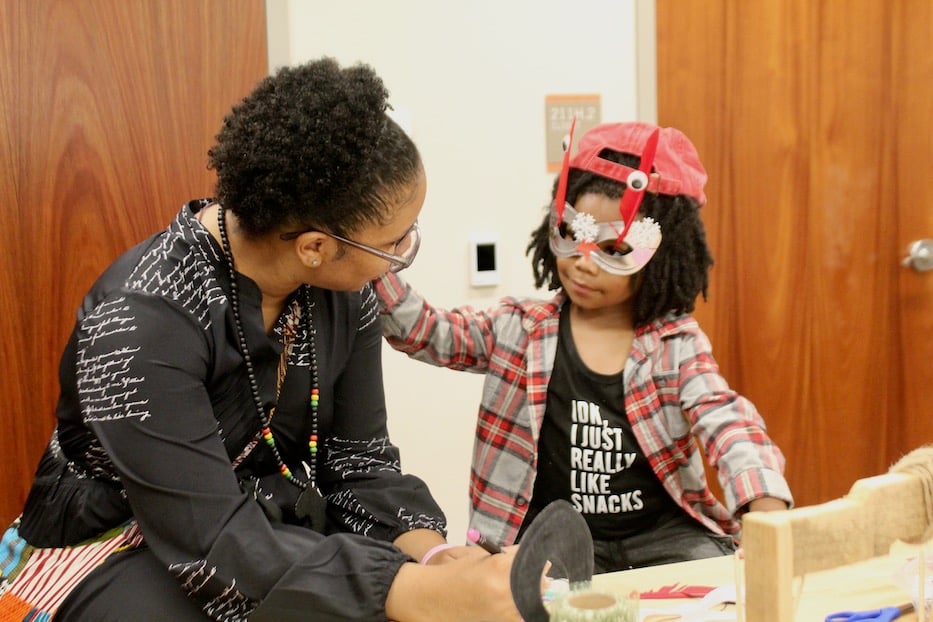
Literary recommendations flew around the room, from New Havener Tochi Onyebuchi’s Goliath to the Skippyjon Jones series for children. Outside the window, attendees headed past, some in cloaks and tiaras to match the day’s theme. When Empath Vintage owner Ashleigh Huckabey struck a pose, paintings of Angela Davis and James Baldwin from the artist Katro Storm shone back in her frames.
Back inside, the mask making showed no sign of stopping. Wright, who just finished her graduate degree in recreation and leisure at Southern Connecticut State University (SCSU), said she was thrilled to see the impact that art could have on young people at such an event. She praised LIT Fest’s focus on Black authors and artists from across Connecticut.
“I feel really rooted and lifted up in a sense,” she said.
“My Joy Is Revolutionary”
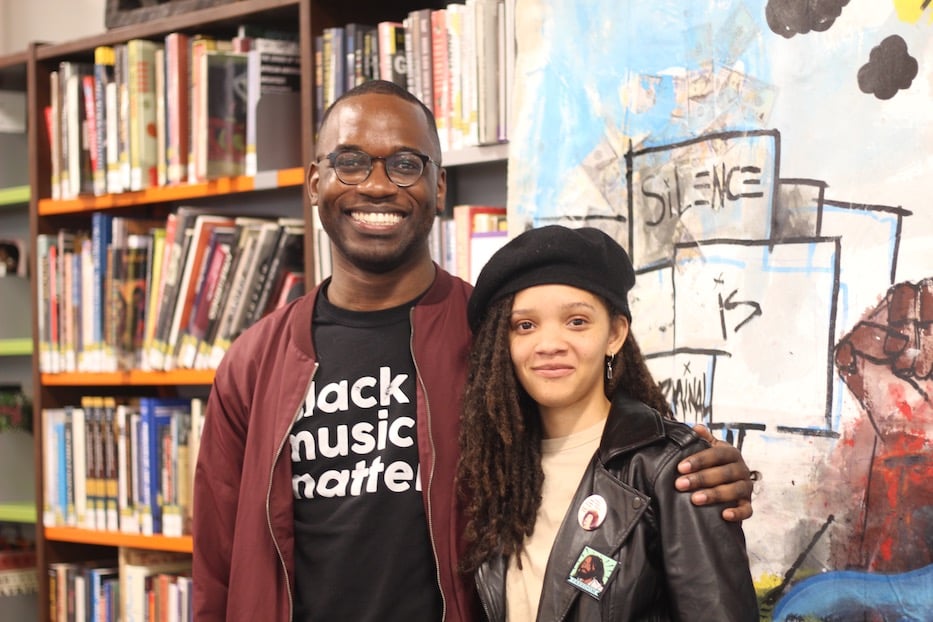
Joel Thompson and Nyzae James. Lucy Gellman Photo.
One room over, BAMN Books Founder Nyzae James and composer Joel Thompson wound the clock back to the work of James Baldwin, which both agreed echoes today. Speaking on the eve of Thompson’s “To Awaken The Sleeper” with the New Haven Symphony Orchestra, James pushed on the specific use of Baldwin, which Thompson singled out among other Black writers, intellectuals, and activists of his era.
“Of all the writers and activists that you could choose from, why Baldwin?” she asked.
Thompson didn’t need to take a beat. He recalled reading “My Dungeon Shook,” an essay written as a letter to Baldwin’s nephew and namesake James, for the first time in college. As he processed the words, “I felt like he was talking to little old me,” he said. The work later became the inspiration for his "My Dungeon Shook: Three American Preludes,” As he spoke, he pulled one hand into his chest and smiled, in a gesture of shared intimacy with Baldwin that transcended space and time.
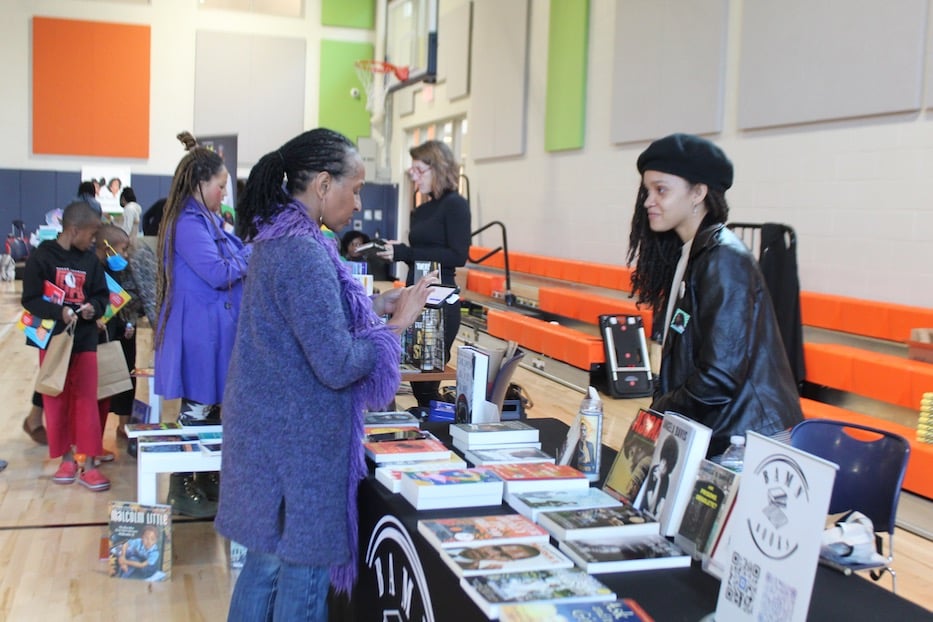
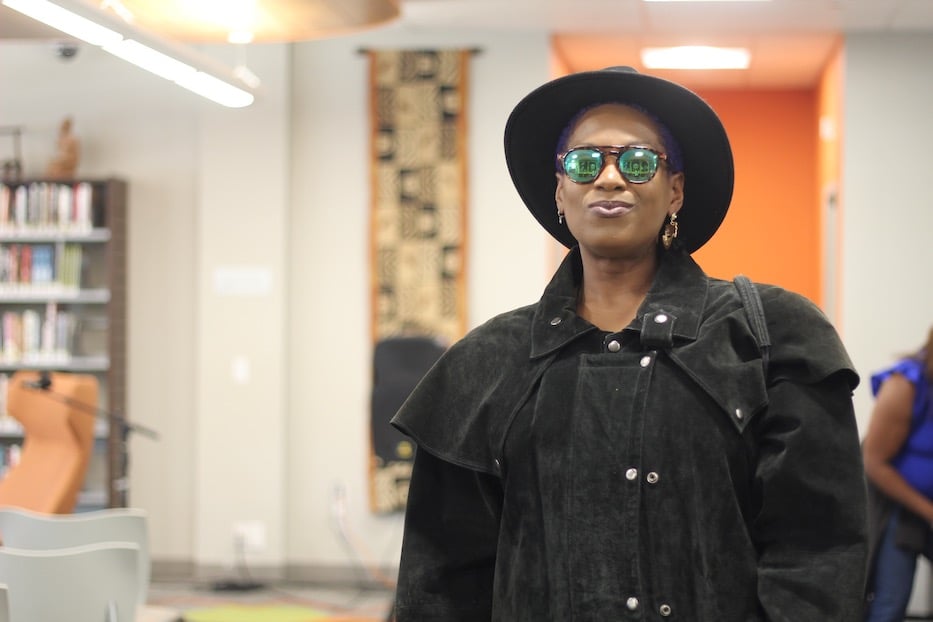
Top: James with a table for BAMN Books at the vendor fair. Bottom: Ashleigh Huckabey. Lucy Gellman Photos.
James had a similar experience, she said. When she was 17, she picked up Baldwin’s The Fire Next Time for the first time. She understood the fire and fury and sheer, eloquent rage with which he wrote, she said. When she picked it up again in 2020, “it hit different,” she said. Everything she had felt acutely at 17 was suddenly amplified at 23, in the midst of parallel pandemics that threatened Black people in America. It was one of the moments that led her to start a mobile bookstore focused on revolutionary Black voices, all of which she had to find outside the classroom.
“How do you feel art and activism collide?” she asked.
Thompson paused, grappling with the label for a moment. Seven years after his Seven Last Words of the Unarmed made it out into the world, he still struggles with the title of artist-activist that is sometimes thrust onto his work and onto him.
“I think there needs to be a distinction between what we do [and activism],” he said. During his time in Atlanta, he said, he worked with organizers running underground “Freedom Schools,” designed to get undocumented students the credit they needed to attend college out of state. The state currently has some of the most restrictive legislation for undocumented students in the country, including a ban on attending public universities.
That’s what he thinks of when he hears “activist,” he said.
“I think both artistry and activism have been sort of subsumed by a capitalist machine,” he added, as a chorus of snapping filled the room in agreement. “We end up sometimes performing in activism.”
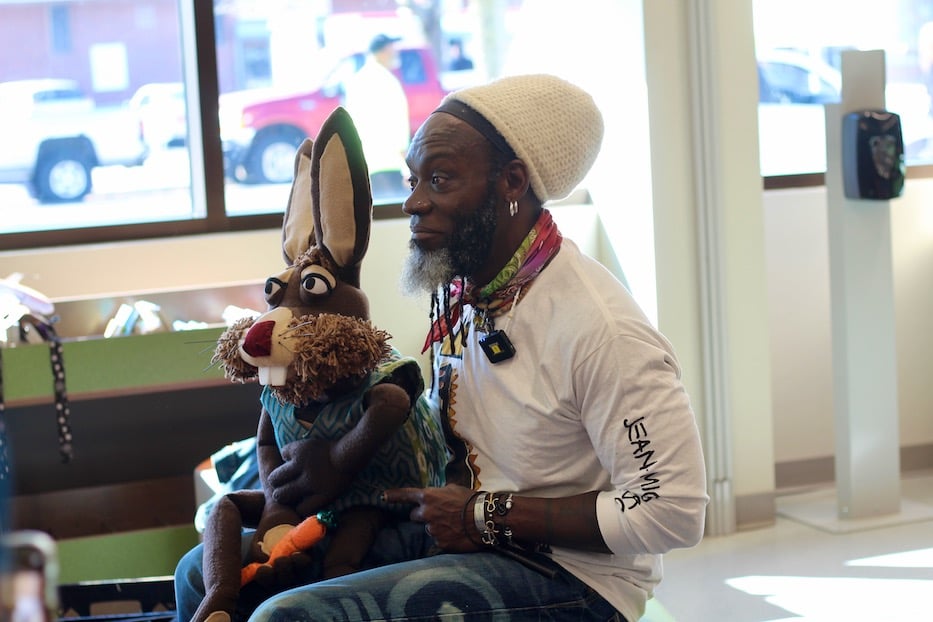
Back on the first floor, a puppet workshop with iYabaArts conjured joy for young readers. Lucy Gellman Photo.
For him, he continued, the antidote is joy. Before Thompson’s Seven Last Words premiered at the University of Michigan in 2015, alumni of the school’s glee club wrote in protest of the work to choral conductor Eugene Rogers. When it was on tour in Washington, D.C. the following year, an attendee stood up, theatrically ripped their program, and walked out during the performance.
Seven years later—and after the social upheaval of 2020—choirs sometimes program the music simply because they want a Black artist on the program. For every choir that handles the piece with grace, Thompson said, there are many that do not. He has to contend with that as an artist.
“There are ways to use the art for good and for evil,” he said. He does not see the work as revolutionary, in part because it has entered the cultural churn of the capitalist mainstream. In previous interviews, he has said that he does not know if he can ever be that vulnerable again, because the work was not meant to be shared with the world.
“What is revolutionary is my joy,” he continued. As composer in residence with the Houston Grand Opera, Thompson had the space to work on The Snowy Day, an opera based on Ezra Jack Keats’ children’s book of the same name. He has dreamed of a work based on N.K. Jemisin’s The Fifth Season, which ends with the line “Have you ever considered the moon?”
“Very rarely do we get a chance to dream,” he said. “Can we imagine a world without colonialism? Can we imagine a world without slavery?”
Before the end of the panel, he pointed to an interview he returns to, of James Baldwin and Maya Angelou talking about his Notes On A Native Son. Baldwin is as sharp as ever, and yet there’s an ease to the conversation that is often absent from Baldwin’s barbed and hopeful addresses, his dense and moving language, the blistering criticisms of America that still believe in its possibility.
“The reason that interview makes my heart smile is he is protecting his peace,” Thompson said. “I find his smile to be revolutionary.”
From Writing Workshops To Poetry On The Plaza
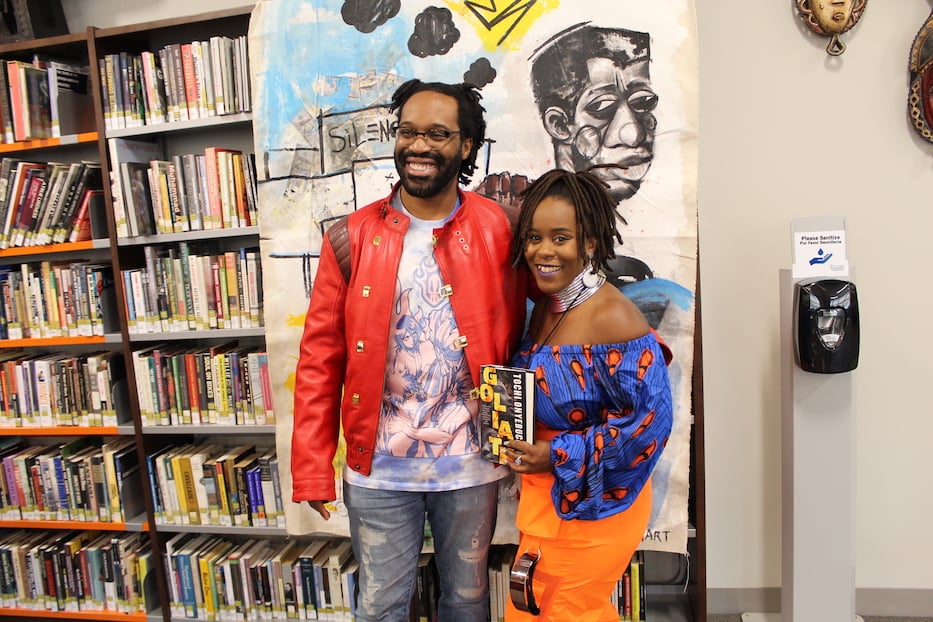
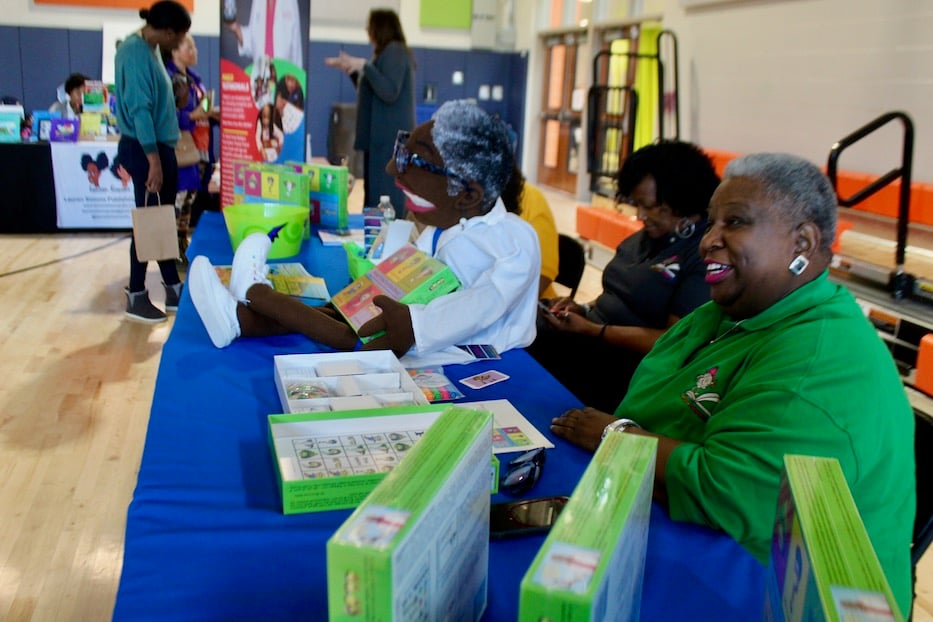
Top: Author Tochi Onyebuchi with Juanita Sunday. Danielle Campbell Photo. Bottom: Dr. Beryl Irene Bailey with PINGO, a punctuation bingo game. Lucy Gellman Photo.
As a vendor fair buzzed in the Q House’s gymnasium, artists spread out across Stetson, from the second floor of the library to the plaza outside. Upstairs, author Tochi Onyebuchi sat down with curator Juanita Sunday, a producer at the International Festival of Arts & Ideas, and began to unravel a personal vision of dystopia. In a smaller conference room nearby, multimedia artist Kolton Harris welcomed an intimate screenwriting workshop with a simple question: What story do you want to tell?
The answer was different for every person who walked into the room, it seemed. An undergraduate at SCSU, workshop participant Maya Lwazi Rose said she’d come out because she’s working on a story about a Black zombie in therapy. Recently, she said, she was surprised to learn that zombies come from African folklore. She’s since been exploring that in her writing.
As she spoke about her work, Harris suggested that characters of color can be multifaceted, urging participants to let their work get messy. As if on cue back upstairs, Onyebuchi noted that he thrives in the chaos of stories.
“Dystopia is tested out on the marginalized first,” he said. So is the future, he added.
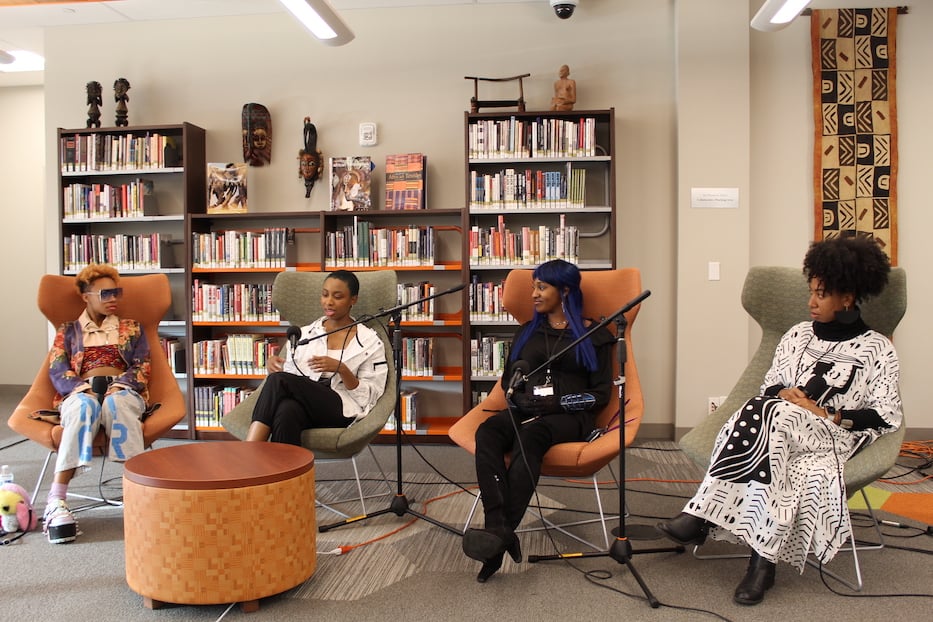
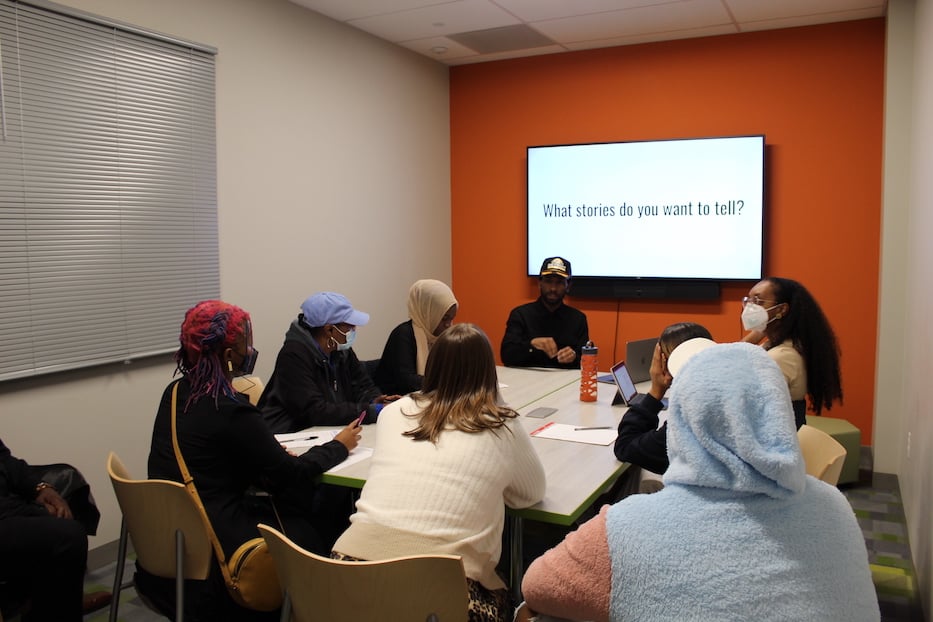
Top: Indigaux, Alana Ladson, Queen Rain and Sha McAllister discuss "Exploring Afrovisualism: Visual Arts through the Femme Aesthetic." Bottom: Harris' writing workshop. Danielle Campbell Photos.
Outside, artists took the stage outside one by one, filling it with poetry and music. Reading from a not-yet-released book of poems, writer Erycka Ortiz wove through a curtain of English and Spanish, slipping from a poem-turned-prayer of forgiveness to a genuine love song to herself. Her voice steady, she traced the journey from anxiety and self-alienation to acceptance of her whole body.
“There’s been a change in tempo and change in step/I’ve seen a new flair of fluorescent lights because I’ve noticed a pair of two feet,” she read. “Yours that have fit completely in the space like lines in the sheets./I’ve danced in the dark before but this light is unknown.”
When she flowed into music, an intimate crowd came in close to the stage, some attendees dancing as others pulled out their phones, and began to film. In an interview after her set, Ortiz said she was grateful for the space to perform.
“At the end of the day, I am a Black person and an Indigenous person, and this is amplifying my own humanity and self-actualization,” she said. “With love, with healing, I continue to be intentional.”
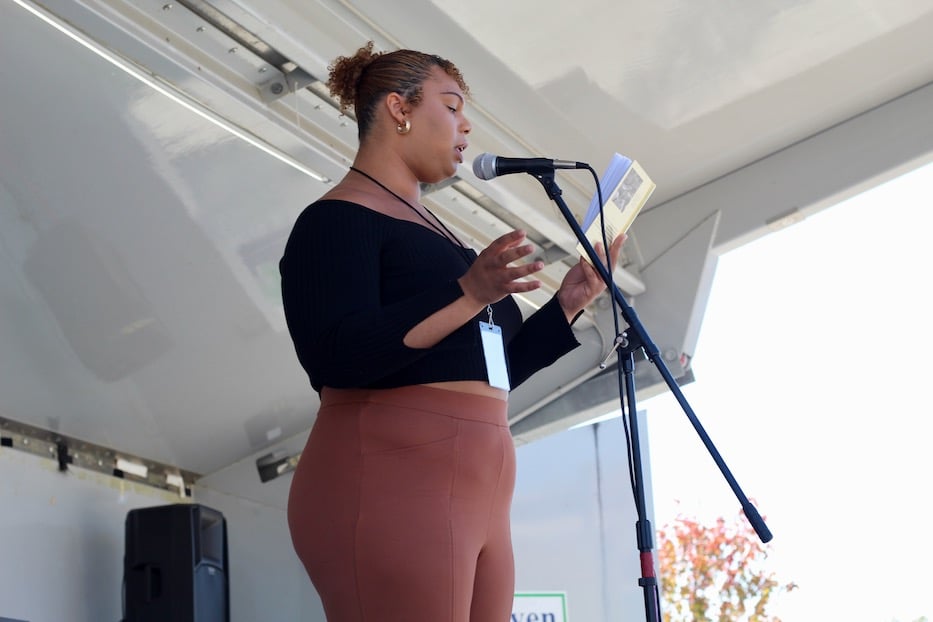

Top: Ortiz. Bottom: Samad Mickens, who runs Beyond The Salt with Christopher Mickens. Lucy Gellman Photos.
Across the street, Samad Mickens slid a cast iron skillet into an oven, and welcomed another customer to his food truck, Beyond The Salt. After an unwelcome pandemic delay, Mickens was able to finally get the business off the ground this year, he said. The truck, which was custom built in Florida, allows him to turn out Mediterranean-inspired dishes that he spent years thinking up.
After working in a series of cooking jobs himself, he said that his mission is to inspire other young chefs who may have small business dreams of their own. He also wants to make the field’s future healthier, he said: he knows what it’s like to give up holidays and weekends for his work. “I want to eliminate that for chefs,” he said.
Back on stage, artist Tyler Goldchain (a.k.a. Tyler Jenkins) danced in the late afternoon, watching as a crowd moved in toward the stage. As the sun soaked the plaza, he announced that the group was going to play Outkast—and would need the audience’s help.
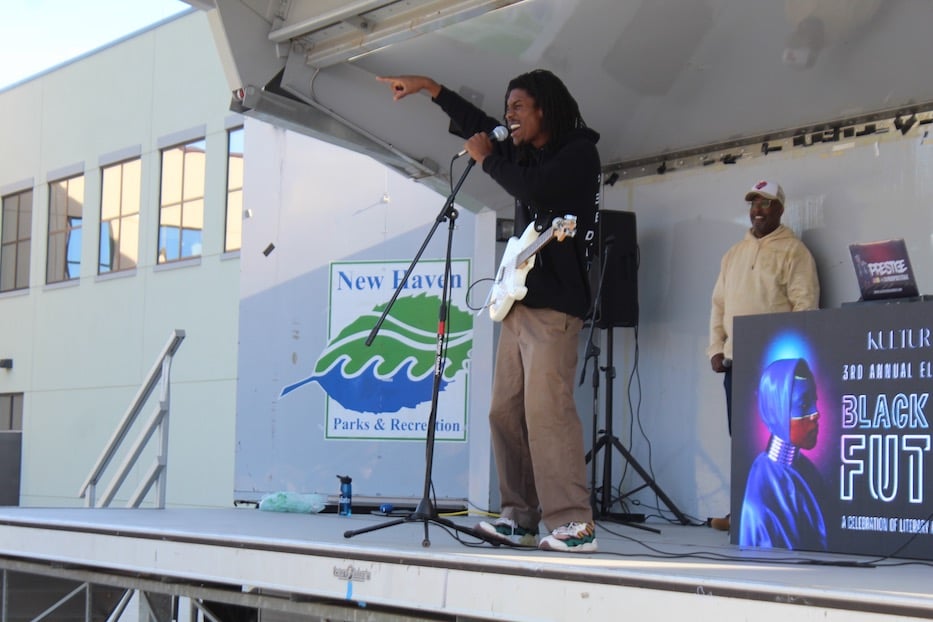
Tyler Goldchain. Lucy Gellman Photo.
Dozens of people responded with a cheer as he sprang into movement and made the song his own. Behind him, drums hammered and rose over the street. He started to speak over the bass.
“We gonna get back to it, gonna get back in, and when this chorus hits, I want everybody to dance and everybody jumpin,” he said. “This is the last time. It’s been an honor. Thank you for having us.”
Bass came back in strong. The future was bright. And for a moment on Dixwell Avenue, it was here.
Danielle Campbell contributed reporting.

